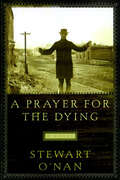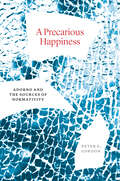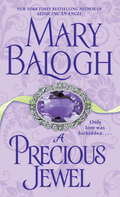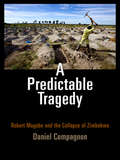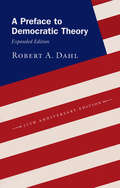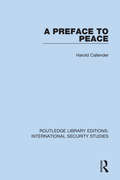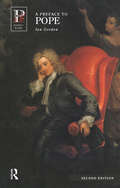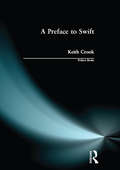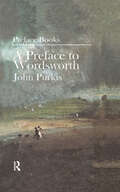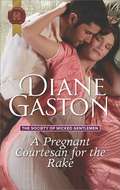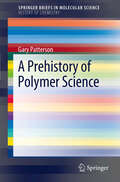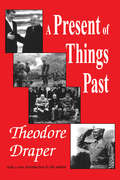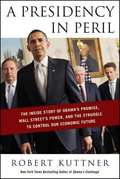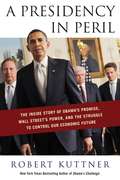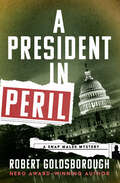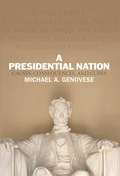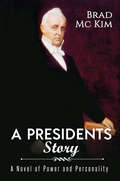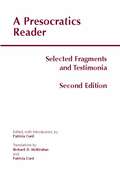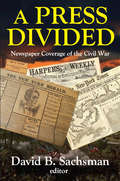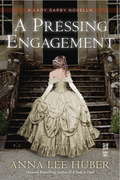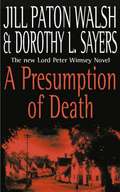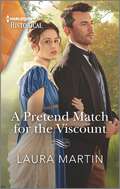- Table View
- List View
A Prayer for the Dying: A Novel
by Stewart O'NanA deadly epidemic threatens the lives and sanity of a Civil War veteran and his family in this “new masterpiece of American literature” (Dennis Lehane).Set in Friendship, Wisconsin, just after the Civil War, A Prayer for the Dying tells of a horrible epidemic that is suddenly and gruesomely killing the town’s residents and setting off a terrifying paranoia. Jacob Hansen, Friendship’s sheriff, undertaker, and pastor, is soon overwhelmed by the fear and anguish around him, and his sanity begins to fray. Dark, poetic, and chilling, Stewart O’Nan’s A Prayer for the Dying examines the effect of madness and violence on the morality of a once-decent man.Praise for A Prayer for the DyingNew York Times Book Review Notable Book of the Year“A Prayer for the Dying reads like the amazing, unrelenting love child of Shirley Jackson and Cormac McCarthy. It’s twisted proof that God will do worse to test a faithful man than the devil would ever do to punish a sinner.”―Chuck Palahniuk“O’Nan again proves himself a writer of dazzling virtuosity and imagination. . . . A mesmerizing story and a brilliant tour de force.” —Publishers Weekly (starred review)
A Precarious Happiness: Adorno and the Sources of Normativity
by Peter E. GordonA strikingly original account of Theodor Adorno’s work as a critique animated by happiness. "Gordon’s confidently gripping and persistently subtle interpretation brings a new tone to the debate about Adorno’s negativism."—Jürgen Habermas Theodor Adorno is often portrayed as a totalizing negativist, a scowling contrarian who looked upon modern society with despair. Peter E. Gordon thinks we have this wrong: if Adorno is uncompromising in his critique, it is because he sees in modernity an unfulfilled possibility of human flourishing. In a damaged world, Gordon argues, all happiness is likewise damaged but not wholly absent. Through a comprehensive rereading of Adorno’s work, A Precarious Happiness recovers Adorno’s commitment to traces of happiness—fragments of the good amid the bad. Ultimately, Gordon argues that social criticism, while exposing falsehoods, must also cast a vision for an unrealized better world.
A Precious Jewel
by Mary BaloghBONUS: This edition contains an excerpt from Mary Balogh's The Secret Mistress. New York Times bestselling author Mary Balogh weaves a sensuous spell of romance that brings together the unlikeliest pair of lovers in the unlikeliest place of all- an infamous London house of pleasure. She was unlike any woman he'd ever met in the ton or the demimonde. But Sir Gerald Stapleton frequented Mrs. Blyth's euphemistically dubbed "finishing school" for pure, uncomplicated pleasure-and nothing else. So why was this confirmed bachelor so thoroughly captivated by one woman in particular? Why did he find himself wondering how such a rare jewel of grace, beauty, and refinement as Priss had ended up a courtesan? And when she needed protection, why did Gerald, who'd sworn he'd never get entangled in affairs of the heart, hasten to set her up as his own pampered mistress to ensure her safety-and have her all to himself? For Priscilla Wentworth, the path leading to Sir Gerald's bed had been as filled with misfortune as it suddenly seemed charmed. But Priss couldn't allow herself to believe she'd ever be more to a man like Sir Gerald than a well-cared-for object of pleasure. Now, despite Gerald's deep distrust of marriage, neither scandal nor society's censure can keep them apart-only the fear of trusting their hearts.
A Predictable Tragedy
by Daniel CompagnonWhen the southern African country of Rhodesia was reborn as Zimbabwe in 1980, democracy advocates celebrated the defeat of a white supremacist regime and the end of colonial rule. Zimbabwean crowds cheered their new prime minister, freedom fighter Robert Mugabe, with little idea of the misery he would bring them. Under his leadership for the next 30 years, Zimbabwe slid from self-sufficiency into poverty and astronomical inflation. The government once praised for its magnanimity and ethnic tolerance was denounced by leaders like South African Nobel Prize-winner Desmond Tutu. Millions of refugees fled the country. How did the heroic Mugabe become a hated autocrat, and why were so many outside of Zimbabwe blind to his bloody misdeeds for so long?In A Predictable Tragedy: Robert Mugabe and the Collapse of Zimbabwe Daniel Compagnon reveals that while the conditions and perceptions of Zimbabwe had changed, its leader had not. From the beginning of his political career, Mugabe was a cold tactician with no regard for human rights. Through eyewitness accounts and unflinching analysis, Compagnon describes how Mugabe and the Zimbabwe African National Union-Patriotic Front (ZANU-PF) built a one-party state under an ideological cloak of anti-imperialism. To maintain absolute authority, Mugabe undermined one-time ally Joshua Nkomo, terrorized dissenters, stoked the fires of tribalism, covered up the massacre of thousands in Matabeleland, and siphoned off public money to his minions--all well before the late 1990s, when his attempts at radical land redistribution finally drew negative international attention.A Predictable Tragedy vividly captures the neopatrimonial and authoritarian nature of Mugabe's rule that shattered Zimbabwe's early promises of democracy and offers lessons critical to understanding Africa's predicament and its prospects for the future.
A Preface to Democratic Theory
by Robert A. Dahl“A Preface to Democratic Theory is well worth the devoted attention of anyone who cares about democracy.” —Political Science QuarterlyThis book by Robert Dahl helped launch democratic theory sixty years ago as a new area of study in political science, and it remains the standard introduction to the field. Exploring problems that had been left unsolved by traditional thought on democracy, Dahl here examines two influential models—the Madisonian, which represents prevailing American doctrine, and its recurring challenger, populist theory—arguing that they do not accurately portray how modern democracies operate. He then constructs a model more consistent with how contemporary democracies actually function, and, in doing so, develops some original views of popular sovereignty and the American constitutional system. For this edition, Dahl has written an extensive new afterword that reevaluates Madisonian theory in light of recent research. And in a new foreword, he reflects back on his influential volume and the ways his views have evolved since he wrote it. For any student or scholar of political science, this new material is an essential update on a gold standard in the evolving field of democratic theory.
A Preface to Peace (Routledge Library Editions: International Security Studies #15)
by Harold CallenderThis book, first published in 1944, assesses the prospects of peace following the Allied victory in the Second World War. It examines the tasks that victory would impose on the victors; the development during the war of US policies, military and political; the errors that caused the war; and the viewpoints and needs of the Allied powers. Concluding that the future peace could be only achieved through the power and influence of the United States, it argues that the process of uniting the Allies in peace would need greater statesmanship than united them in war against a common enemy.
A Preface to Pope (Preface Books)
by Ian Robert GordonThis second edition of Ian Gordon's A Preface to Pope places the poet within the social, cultural and intellectual context of his time. It throws new light on the theoretical and imaginative structures of Pope's poetry focusing on the linguistic complexity at its centre. It offers a critical survey of his work and also contains introductory essays. The book concludes with a reference section which includes indispensible information on places and people in Pope's poetry, together with a glossary of technical terms and a guide to further reading.
A Preface to Swift (Preface Books)
by Keith CrookJonathan Swift's moral and political satires astonished his contemporaries and still have the power to disturb, with their compelling images and unsettling turns of argument, and to delight, with their charm and inventive wit. A Preface to Swift examines the complex appeal of this fierce critic of oppression.While thematically arranged, the text follows a broadly chronological account of Swift's life to show his development as a writer from the prolific and inventive iconoclast to the mature satirist whose enduring memory of past events produced warm friendship as well as strong resentment. It considers in detail his engagement with the corruption of over-secure politicians and his opposition to the easy rationalism of free-thinking pundits. Gulliver's Travels is shown to be a coherent critique of eighteenth-century ideas of science, education and politics in which the order of the books ('the progress of the fable') is highly significant for its whole meaning. While this is a major focus, Keith Crook also discusses a wide range of Swift's other works, including his early satires, his political writings, his poems and his letters.Detailed chronological charts place his life and works in the political and cultural context, and illustrations have been chosen with commentaries to extend the reader's sense of Swift's connections with London, Ireland and his contemporaries. This will be a particularly useful introduction to students who are studying satire as a genre; the early eighteenth-century literary, scientific, philosophical and political context; the representation of women; the political relation of Ireland to England; and the position of the artist within society, especially in connection with the levers of power.
A Preface to Wordsworth: Revised Edition (Preface Books)
by John PurkisProbably the most famous of the Romantic poets, William Wordsworth worked with and influenced many of the leading poets of the age. This excellent introduction to his life and works sets his writing firmly in the context of his times. John Purkis provides an outline of Wordsworth's life and cultural background and their effect on his work, and examines his verse, from the earliest school poems to the final years.
A Preface to Wordsworth: Revised Edition (Preface Books)
by John PurkisProbably the most famous of the Romantic poets, William Wordsworth worked with and influenced many of the leading poets of the age. This excellent introduction to his life and works sets his writing firmly in the context of his times. John Purkis provides an outline of Wordsworth's life and cultural background and their effect on his work, and examines his verse, from the earliest school poems to the final years.
A Pregnant Courtesan for the Rake: Regency Christmas Wishes A Pregnant Courtesan For The Rake Lord Hunter's Cinderella Heiress (The Society of Wicked Gentlemen #3)
by Diane GastonClaiming the courtesan’s child…It’s been more than three months, but Oliver Gregory still remembers the exquisite night he shared with a beautiful woman in Paris. Discovering her working at the discreet London gentlemen’s club he owns comes as a shock…even more so when he realizes she’s pregnant!Oliver knows the pain of being an outcast and will do all in his power to ensure his child is not born illegitimate. Cecilia will return to his bed…as his wife!
A Prehistory of Polymer Science (SpringerBriefs in Molecular Science #2)
by Gary Patterson Carnegie Mellon UniversityPolymer science is now an active and thriving community of scientists, engineers and technologists, but there was a time, not so long ago, when there was no such community. The prehistory of polymer science helps to provide key insights into current issues and historical problems. The story will be divided into an ancient period ( from Greek times to the creation of the molecular consensus), a nascent period (from Dalton to Kekule to van't Hoff) and a period of paradigm formation and controversy (from Staudinger to Mark to Carothers). The prehistory concludes with an account of the epochal 1935 Discussion of the Faraday Society on "Polymerization". After this meeting an active community engaged in trying to solve the central problems defined by the discussions.
A Present of Things Past: Selected Essays
by Theodore DraperTheodore Draper is one of America's most trenchant and informed critics. A Present of Things Past gathers together ten of his most recent and most powerful selected essays, in which Draper, with his customary acuity and wit, tackles a host of issues that define America's political culture. A Present of Things Past is concerned with a reexamination of the Second World War in both its military and its political aspects; the trajectory of American conservatism as it manifested itself during the Reagan years; the rise of Gorbachev and the history of "reform" in the Soviet Union; the revisionist debate over the origins and history of American communism; and the persistent mystery of a man named Max Eitingon, who was, depending on one's reading of the sources, either an important figure in the history of psychoanalysis or an agent of the Soviet secret police, or both. In "American Hubris," Draper illuminates the assumptions that have guided American foreign policy in the postwar period, and concludes that our costly misadventures--in Korea, Vietnam, Lebanon, and elsewhere--cannot be considered a string of aberrations. They were, he argues, a consequence of the Truman Doctrine. In "Reagan's Junta," Draper observes: "This is supposed to have been the era of the imperial presidency. It has turned out to be the era of presidencies that have tried to make themselves imperial-and failed." Throughout these compelling essays, Draper demonstrates the uses and abuses to which history has been put by ideologues of both the left and the right. He finds unacceptable, for example, the practice of many journalists of fictionalizing their sources. The New York Times has called Draper "one of the clearer-eyed observers of the issues that torment us." A Present of Things Past enhances that reputation.
A Presidency in Peril
by Robert KuttnerAs with many progressives who had pinned their hopes on the promise of Barack Obama, Kuttner (co-editor of The American Prospect magazine) has become disappointed with President Obama's failure to deliver transformational change in the realm of US economic policy. He delivers a work of reportage, analysis, and critique that seeks to understand the reasons for Obama's basic acquiescence to the priorities of Wall Street over those of Main Street and his failure to push for strong financial regulation in the face of economic crisis. Although he is critical of Obama's economic performance in the first two years, he holds out hope that the President may yet salvage his legacy and offers advice on how Obama could go about redeeming his presidency. Annotation ©2010 Book News, Inc. , Portland, OR (booknews. com)
A Presidency in Peril: The Inside Story of Obama's Promise, Wall Street's Power, and the Struggle to Control Our Economic Future
by Robert KuttnerAs with many progressives who had pinned their hopes on the promise of Barack Obama, Kuttner (co-editor of The American Prospect magazine) has become disappointed with President Obama's failure to deliver transformational change in the realm of US economic policy. He delivers a work of reportage, analysis, and critique that seeks to understand the reasons for Obama's basic acquiescence to the priorities of Wall Street over those of Main Street and his failure to push for strong financial regulation in the face of economic crisis. Although he is critical of Obama's economic performance in the first two years, he holds out hope that the President may yet salvage his legacy and offers advice on how Obama could go about redeeming his presidency. Annotation ©2010 Book News, Inc. , Portland, OR (booknews. com)
A President in Peril (The Snap Malek Mysteries)
by Robert GoldsboroughA Chicago crime reporter is out to stop a local hate group from assassinating President Truman in this historical crime thriller.Chicago, 1948. As President Harry Truman prepares to visit Chicago in the final tense days of his reelection campaign, police reporter Steve “Snap” Malek receives an ominous threat. An anti-Semitic group plans to assassinate the president for officially recognizing the new state of Israel. When Malek refuses the hate group’s demands for newspaper publicity, they begin killing Chicagoans—one a day, including a policeman and a fireman. As the so-called New Reich promises more of the same, Malek begins his dogged hunt to uncover their true identities. Along the way, he meets maverick automaker Preston Tucker, and even gets the chance to drive the revolutionary Tucker Torpedo. But when Truman arrives in Chicago for a parade, time is running out for Malek to stifle the deadly plot.
A Presidential Nation
by Michael A. GenoveseThe Washington Monument, the Lincoln Memorial, the Jefferson Memorial. Why do we devote monuments to the presidents? Why do we honor them, instead of Congress, or the courts?A Presidential Nationexamines how the presidency-an office limited by the Constitution and separation of powers-became the centerpiece of American government. Michael A. Genovese argues that in rebelling against the British, the Framers of the Constitution invented a circumscribed presidency to guard against executive tyranny. Yet, over time, presidential power has risen and congressional power declined to a point where the United States has a near imperial presidency. Reexamining the status of presidential power in the post-9/11 world, Dr. Genovese considers the alternatives, if any, to the current model of presidential power. A Presidential Nationis perfect for students of American Presidency and Federal Governance courses and anyone interested in the changing authority of the American political system.
A Presidential Nation
by Michael A. GenoveseThe Washington Monument, the Lincoln Memorial, the Jefferson Memorial. Why do we devote monuments to the presidents? Why do we honor them, instead of Congress, or the courts? A Presidential Nation examines how the presidency--an office limited by the Constitution and separation of powers--became the centerpiece of American government. Michael A. Genovese argues that in rebelling against the British, the Framers of the Constitution invented a circumscribed presidency to guard against executive tyranny. Yet, over time, presidential power has risen and congressional power declined to a point where the United States has a near imperial presidency. Reexamining the status of presidential power in the post-9/11 world, Dr. Genovese considers the alternatives, if any, to the current model of presidential power. A Presidential Nation is perfect for students of American Presidency and Federal Governance courses and anyone interested in the changing authority of the American political system.
A Presidential Nation
by Michael A. GenoveseThe Washington Monument, the Lincoln Memorial, the Jefferson Memorial. Why do we devote monuments to the presidents? Why do we honor them, instead of Congress, or the courts? A Presidential Nation examines how the presidency--an office limited by the Constitution and separation of powers--became the centerpiece of American government. Michael A. Genovese argues that in rebelling against the British, the Framers of the Constitution invented a circumscribed presidency to guard against executive tyranny. Yet, over time, presidential power has risen and congressional power declined to a point where the United States has a near imperial presidency. Reexamining the status of presidential power in the post-9/11 world, Dr. Genovese considers the alternatives, if any, to the current model of presidential power. A Presidential Nation is perfect for students of American Presidency and Federal Governance courses and anyone interested in the changing authority of the American political system.
A Presidents Story
by Brad McKimAt the dawn of the 19th century, fourteen men will succeed George Washington in leading the young United States. As their personal tales intertwine and overlap with one another on their way to the Presidency, they craft an election system that is, at once, chaotic and orderly. Their ambition forces them to join political parties even as those parties’ agendas are not always clear. Their supporters engage in ever more vicious public and private campaigns. They rely on political favors and a partisan press to win votes and to solicit compromise. And yet, they follow Washington’s example and hand over power after each election to the newest victor, typically with unprecedented grace and humility. These are the practices that survive, even as a Civil War looms that threatens to destroy virtually everything else about the young country.
A Presocratics Reader: Selected Fragments and Testimonia
by Richard D. Mckirahan Patricia CurdBuilding on the virtues that made the first edition of A Presocratics Reader the most widely used sourcebook for the study of the Presocratics and Sophists, the second edition offers even more value and a wider selection of fragments from these philosophical predecessors and contemporaries of Socrates.With revised introductions, annotations, suggestions for further reading, and more, the second edition draws on the wealth of new scholarship published on these fascinating thinkers over the past decade or more, a remarkably rich period in Presocratic studies.At the volume's core, as ever, are the fragments themselves--but now in thoroughly revised and, in some cases, new translations by Richard D. McKirahan and Patricia Curd, among them those of the recently published Derveni Papyrus.
A Press Divided: Newspaper Coverage of the Civil War (Journalism Ser.)
by David B. SachsmanA Press Divided provides new insights regarding the sharp political divisions that existed among the newspapers of the Civil War era. These newspapers were divided between North and South, and also divided within the North and South. These divisions reflected and exacerbated the conflicts in political thought that caused the Civil War and the political and ideological battles within the Union and the Confederacy about how to pursue the war. In the North, dissenting voices alarmed the Lincoln administration to such a degree that draconian measures were taken to suppress dissenting newspapers and editors, while in the South, the Confederate government held to its fundamental belief in freedom of speech and was more tolerant of political attacks in the press. This volume consists of eighteen chapters on subjects including newspaper coverage of the rise of Lincoln, press reports on George Armstrong Custer, Confederate women war correspondents, Civil War photojournalists, newspaper coverage of the Emancipation Proclamation, and the suppression of the dissident press. This book tells the story of a divided press before and during the Civil War, discussing the roles played by newspapers in splitting the nation, newspaper coverage of the war, and the responses by the Union and Confederate administrations to press criticism.
A Pressing Engagement (A Lady Darby Mystery #4)
by Anna Lee HuberIn this delightful novella from the national bestselling author of A Study in Death, Lady Kiera Darby has one last mystery to solve before she can walk down the aisle... Scotland, 1831. With her wedding to fellow investigator Sebastian Gage only a day away, Kiera is counting down the hours. But just when matrimonial jitters threaten to consume her, Kiera receives a welcome distraction in the form of a mysterious gold necklace. The Celtic torc, thought missing for decades, was directly involved in a recent investigation. Now, Kiera feels compelled to uncover the truth behind its sudden reappearance. But with an overwhelming flock of wedding guests, a muddled cat, an unpaid favor, and a ferocious storm throwing things into disarray, it's anyone's guess whether Kiera and Gage will actually make it to the altar... Includes an exclusive preview of the next Lady Darby Mystery, As Death Draws Near Praise for the Lady Darby Mysteries "[A] fascinating heroine...A thoroughly enjoyable read!"--Victoria Thompson, national bestselling author "[A] clever heroine with a shocking past and a talent for detection."--Carol K. Carr, national bestselling author "[A] must read...One of those rare books that will both shock and please readers."--Fresh Fiction
A Presumption of Death
by Dorothy L. Sayers Jill Paton WalshIn A Presumption of Death, Jill Paton Walsh tells how World War II changed the lives of Peter, Harriet and their growing family. The story opens in 1940. Harriet Vane--now Lady Peter Wimsey--has taken her children to safety in the country. But the war has followed them: glamorous RAF pilots and even more glamorous land-girls scandalise the villagers; the blackout makes the night-time lanes as sinister as the back alleys of London.<P> Then the village's first air raid practise ends with a very real body on the ground--not a war casualty but a case of plain, old-fashioned murder. And even before the second body is found, Lord Peter Wimsey and his brilliant wife are on their way to finding the killer.
A Pretend Match for the Viscount (Matchmade Marriages #2)
by Laura MartinA sparkling Regency love story about two opposites in a pretend engagement Rescued by the viscountTo save her from ruin!Miss Eliza Stanley is the life and soul of her first Season—then she is scandalously compromised! Luckily, the brooding Viscount Thannock steps in to offer her a fake engagement, giving her time to find another suitor and prevent her disgrace. She&’s intrigued by this serious, honorable man… If only falling for him wouldn&’t mean giving up all she loves about her new life…From Harlequin Historical: Your romantic escape to the past.Matchmade MarriagesBook 1: The Marquess Meets His MatchBook 2: A Pretend Match for the ViscountBook 3: A Match to Fool Society
